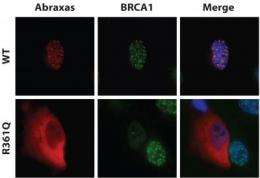Study finds new member of the breast-cancer gene network

The infamous BRCA genes do not act alone in causing cancer; there is a molecular syndicate at work preventing the way cells normally repair breaks in DNA that is at the root of breast cancer. But finding all of the BRCA molecular collaborators has been elusive.
Researchers at the Perelman School of Medicine at the University of Pennsylvania and the University of Oulu, Finland, published their discovery of a mutation in the Abraxas gene, which interacts with the well-known breast-cancer gene BRCA1, in Science Translational Medicine this week.
The mutation affects the ability of the Abraxas protein to enter the nucleus and bind to sites adjacent to damaged DNA. Abraxas organizes a large BRCA1 protein-containing complex that is required to fix DNA-damage. A mutated Abraxas protein impairs the BRCA1 complex's ability to migrate to sites of DNA damage and repair breaks. This results in alterations to the genome that increase breast-cancer risk, notes senior author Roger Greenberg, PhD, associate professor of Cancer Biology.
Before 1990, breast cancer was generally viewed as a disease resulting from a complex relationship between multiple genes and environmental factors. The discovery that it is linked to mutations in BRCA1 in certain families transformed this view, and since that time, mutations in several genes involved in BRCA1-related pathways have also been associated with breast cancer susceptibility.
About ten percent of all breast cancers are thought to be hereditary - caused by genes passed down family lines. This type of cancer susceptibility represents more than 20,000 new cases of breast cancer annually in the United States. Relatively large numbers of families in which detailed medical records are kept are necessary to make associations about mutations that may cause disease.
To get a clearer picture of the heritable causes of breast cancer, the Penn group, working with Finnish scientists at the University of Oulu, screened 125 Northern Finnish breast cancer families for Abraxas mutations. Greenberg collaborated with Dr. Robert Winqvist, a Finnish breast cancer researcher and co-senior author who maintains a large collection of DNA samples from Finnish families that have multiple cases of breast cancer. The group found women who had the Abraxas mutation, as well as breast cancer, in four families with a history of breast cancer.
This association makes Abraxas the newest candidate for yet-unexplained breast cancer susceptibility.
The mutation they found affects a region on chromosome 4 that governs the signal to guide Abraxas to the site of DNA damage in the nucleus. In addition, the researchers showed that the mutation impairs guiding of the Abraxas protein in cultured cells—the mutant protein in these cultures was also not recruited to sites of DNA damage compared to control cells in culture.
What's more, expression of the Abraxas mutation caused hypersensitivity to ionizing radiation-- a cause of DNA damage -- and reduced BRCA1 localization at sites of DNA damage in several cell lines.
Taken together, these observations suggest that the Abraxas mutation keeps the Abraxas protein from migrating with its binding partners at sites where DNA repair is needed, and establishes Abraxas as a breast cancer susceptibility gene. In time, this mutation may be added to a list of about 14 mutations for which breast cancer–prone families can be tested, say the authors.















